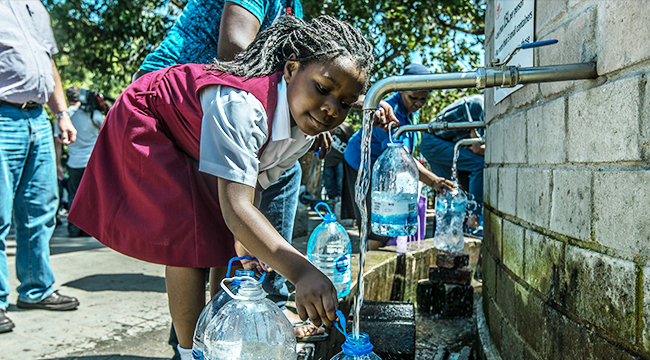
California just recently came out of a terrifying drought, which underscores the very real problems that will face water systems going forward. Simply put, many of the places where we live have water systems heavily affected by climate change. And for Cape Town, South Africa’s largest city with nearly four million residents, it’s close to becoming an outright crisis.
Simply put, there is, potentially, a day on the calendar (“Day Zero”) when Cape Town, which is already rationing its water, will officially run out. And there may not be many realistic long-term solutions, if the drought keeps up, but here are the essential details of this crisis:
- Cape Town residents are currently living on only 13 gallons of water a day: The water ration, already a quarter of what your average American uses in a day, was just cut by nearly half. For contrast, thirteen gallons is enough water for a six minute shower, with one gallon left over.
- The problem is simple. It’s not raining: Cape Town has six major dams, called the “Big Six,” that provide the city with its water supply. The problem is that it’s had three straight years of drought, something the region only sees once every three centuries or so, drying up its reservoirs to perilously low capacity. Simply put, there’s too many people, not enough water, a problem that’s been aggravated since 1995 as Cape Town’s population grew, but its water system lagged. This has been a struggle for Cape Town for years, but the current drought has overwhelmed its water management strategies.
- That means there will come a point, “Day Zero,” when the reservoirs don’t have enough water to support the city: Authorities monitoring the Big Six believe that by April, the system will go below 13.5% capacity, in other words, it will be de facto out of water.
- There aren’t a lot of long-term solutions: The only real solution will be Cape Town getting a lot of rain over the next month and a half, enough to replenish the reservoirs. In the meantime, it’s working on desalinizing ocean water to supply the system with enough drinking water to keep the city going. But that’s a temporary solution.
- The only solution many Cape Towners have is to try and tough it out, but there’s only so long before something snaps: The drought has had enormous economic effects, driving up the price of food while also seeing Cape Town’s agricultural sector lose thousands of jobs. It’s not clear what the long-term effects will be, but whether it’s rising social tensions or mass migration away from the city, it won’t help the situation.
In short, Cape Town needs water. It’s not clear, yet, exactly where the city will find it, and if it’ll find it in time.
